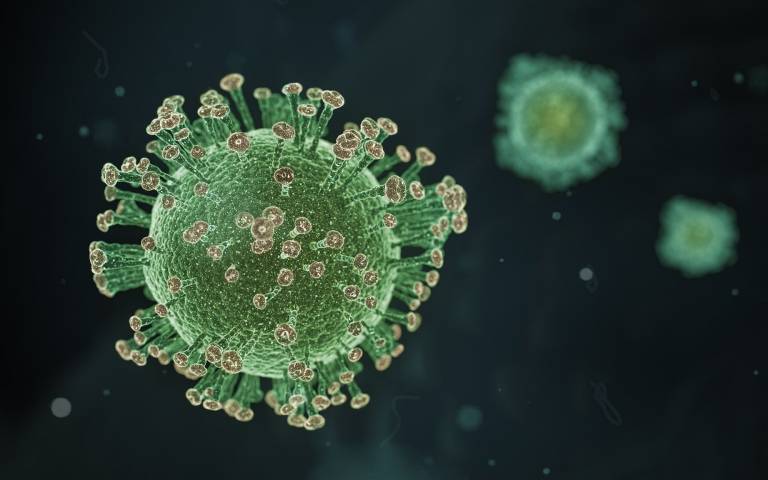Professor Judith Breuer joins major new alliance to map spread of coronavirus
23 March 2020
UCL Pathogen Genomics Unit Director, Professor Judith Breuer, has been announced as one of the leading UK scientists to be part of a major new genome sequencing consortium which will map the spread of Covid-19.

The Covid-19 Genomics UK Consortium comprises of the NHS, Public Health Agencies, Wellcome Sanger Institute, and numerous academic institutions including UCL. It will deliver large scale, rapid sequencing to better understand the spread of Covid-19 and share this intelligence with hospitals, regional NHS centres and the Government.
Samples from patients with confirmed cases of Covid-19 will be sent to a network of sequencing centres which currently includes Belfast, Birmingham, Cambridge, Cardiff, Edinburgh, Exeter, Glasgow, Liverpool, London, Norwich, Nottingham, Oxford and Sheffield.
By looking at the whole virus genome in people who have had confirmed cases of Covid-19, scientists can monitor changes in the virus at a national scale to understand how the virus is spreading and whether different strains are emerging. This will help plan public health interventions, contributing to improving clinical care of patients and the saving of lives.
Today, the Government and the UK’s Chief Scientific Adviser Sir Patrick Vallance, unveiled £20 million investment to support the consortium in looking for breakthroughs that help the UK respond to this and future pandemics, and save lives.
UCL, which, for over 10 years, has been a world leader in viral genome sequencing, will play a key role in sequencing viruses from the London area which is currently experiencing the highest numbers of hospitalised cases. Based in UCL’s Zayed Centre for Research, Professor Breuer will be leading this work, closely supported by colleagues in the co-located UCL Genomics (Led by Dr Sergi Castellano).
Professor Breuer said: “Covid-19 is major threat to London and the entire world. We at UCL are incredibly proud to be part of the national rapid response efforts to contain the virus. The Covid-19 Genomics UK Consortium will provide important data to Public Health England about how the virus is spreading. Viral sequencing provides a new tool which will aid national public health efforts to interrupt the spread of the virus.
“Based in the heart of London, UCL is uniquely placed to respond to this because of our valued collaborations across the capital. We are extremely grateful to our colleagues across UCL and in genome centres across London for volunteering to support this project. This will enable us to man the pipeline seven days a week with capacity to increase this to 24/7 should it be necessary. This effort builds on the joint investment in genomics infrastructure made by the ULCH/UCL and GOSH/UCL NIHR Biomedical Research Centres and we are incredibly grateful for their unstinting support.”
Announcing the launch of the Consortium, Business Secretary Alok Sharma said: “At a critical moment in history, this new consortium will bring together the UK’s brightest and best scientists to build our understanding of this pandemic, tackle the disease and ultimately, save lives. As a Government we are working tirelessly to do all we can to fight Covid-19 to protect as many lives and save as many jobs as possible.”
Government Chief Scientific Adviser, Sir Patrick Vallance said: “Genomic sequencing will help us understand Covid-19 and its spread. It can also help guide treatments in the future and see the impact of interventions. The UK is one of the world’s leading destinations for genomics research and development, and I am confident that our best minds, working as part of this consortium, will make vital breakthroughs to help us tackle this disease.”
The UK Consortium, supported by the Government, including the NHS, Public Health England, UK Research and Innovation (UKRI), and Wellcome, will enable clinicians and public health teams to rapidly investigate clusters of cases in hospitals, care homes and the community, to understand how the virus is spread and implement appropriate infection control measures.
Professor Sharon Peacock, Director of the National Infection Service, Public Health England, added: “This virus is one of the biggest threats our nation has faced in recent times and crucial to helping us fight it is understanding how it is spreading. Harnessing innovative genome technologies will help us tease apart the complex picture of coronavirus spread in the UK, and rapidly evaluate ways to reduce the impact of this disease on our society.”
Links
Image
- Credit: Yuri Samilov via Flickr 2.0 Generic (CC BY 2.0)
Further information
- Source: UCL Media Office
- Media Contact: Henry Killworth, Tel: +44 207 679 5296
 Close
Close

